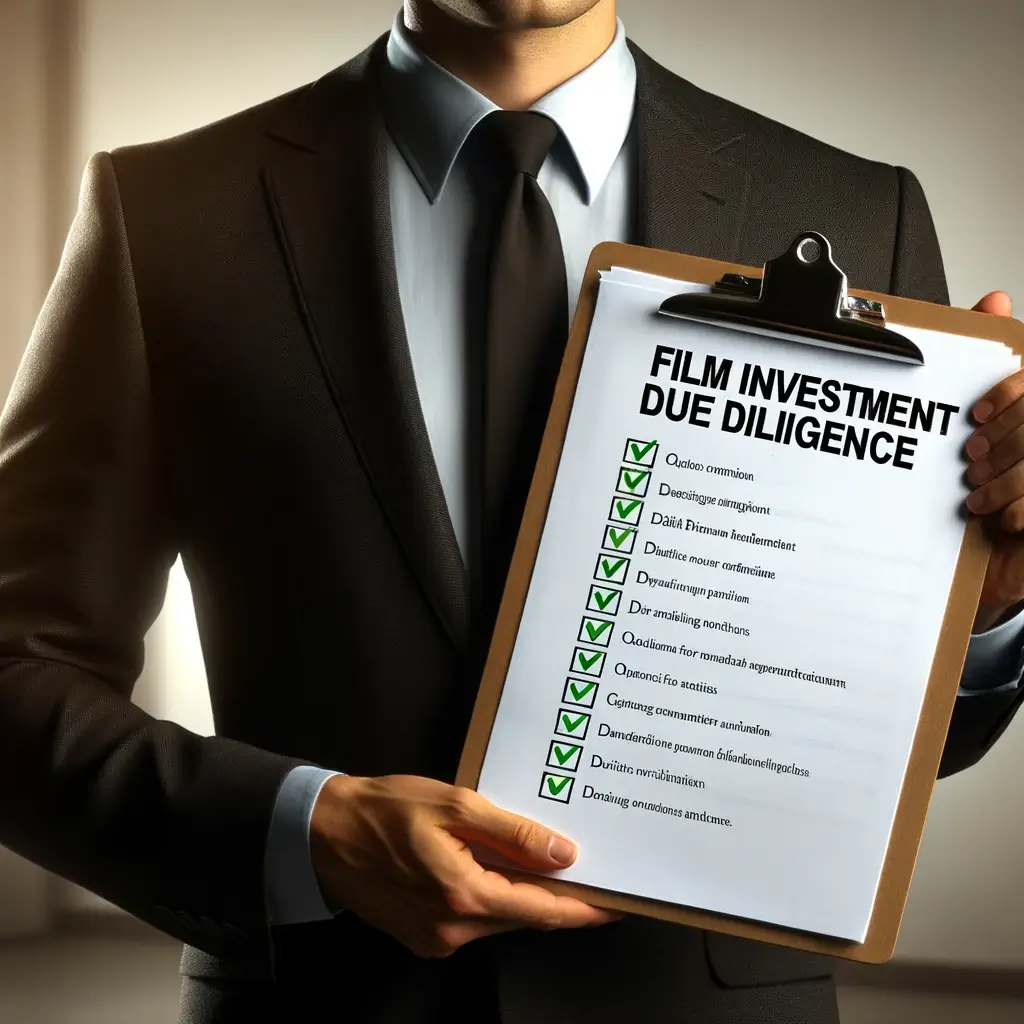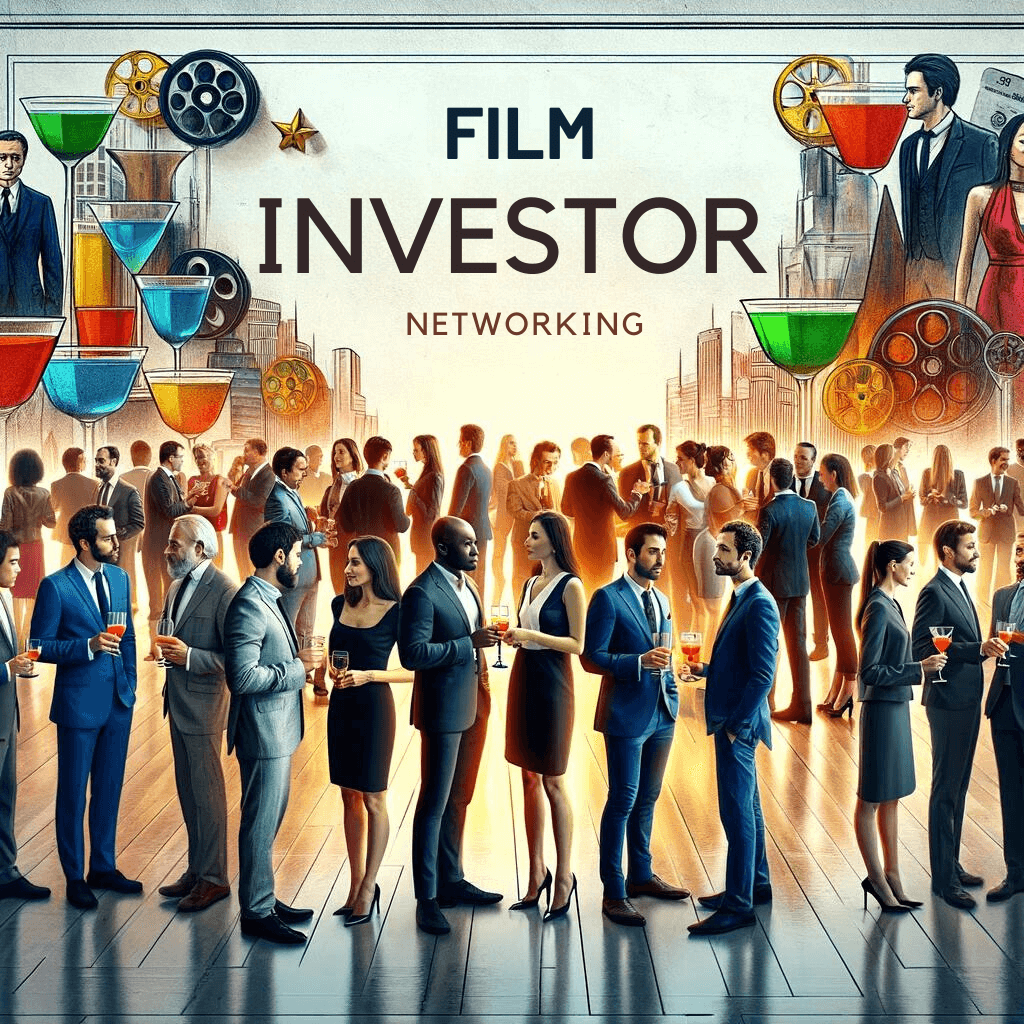Hey, potential film investor! If you haven’t checked out Parts 1-3 of the essential tips for new investors series yet, hit the pause button and catch up. We’ve covered the basics, and now it’s time for the reality check.
Making informed decisions isn’t about just knowing stuff – it’s about how you USE that knowledge! Part 4 provides tools, resources and strategies to turn information into smart film investment decisions. We’ll cover where to find reliable industry intel, how to build your network of experts, and the importance of seeking professional guidance.
Jump To:
Understanding Risk: Essential Tips for New Investors
Film investment is exciting, but it’s also inherently risky – way more volatile than your typical stocks or real estate.
- Not Your Regular Investment: Unlike buying into a well-established company, with films, you’re backing a project yet to be made, with no guaranteed income. Box office results are wildly unpredictable, and even critically acclaimed films can bomb financially.
- Potential for Loss: Be prepared for the possibility that you might not see your initial investment back, let alone profits. That’s why starting with smaller investments you can afford to lose is generally wise.
- Limited Liquidity: Unlike stocks you can quickly sell off, film investments are usually long-term. Getting your money back can be difficult before the film has completed its entire distribution cycle (which can take years).
Due Diligence: Your Best Defense Against Bad Investments

Okay, risk isn’t meant to scare you off entirely! It’s about being strategic. Thorough due diligence minimizes (but doesn’t eliminate) those risks. Let’s break it down:
1) Project Evaluation
- Script Gold: A powerful script is the foundation. Strong premise, relatable characters, tight structure – does it hook you and make you want to see it onscreen?
- Director’s Track Record: Does the director have the skills to execute the vision? Look into their past work on similar projects (check out those reels!).
- Star Power: A-list actors or up-and-comers with buzz can boost box office appeal. But beware projects relying solely on one name – it’s not a success guarantee.
- Realistic Budget: A $5 million indie rom-com needing huge CGI battles? Red flag! The budget needs to align with the scale of the film.
- Smart Distribution: Does the plan match the film? An arthouse drama shouldn’t rely solely on wide theatrical release. Investigate if they have potential distribution deals or a savvy festival strategy.
2) Company Track Record
- Past Successes (or Failures): Did their previous projects make money? Critical acclaim alone doesn’t pay the bills. Have they delivered on investor promises before?
- Solid Relationships: Strong distributors, sales agents, or established financiers show industry trust in the company.
- Reputable Management: Shady producers exist! Research the backgrounds of key decision-makers – you want experience and ethical track records.
3) Research Tools
- Your Best Friend: IMDb Pro: Goes beyond regular IMDb with production status, box office data, and contact info (requires subscription).
- Number Crunching: The Numbers: breaks down budgets, historical trends, and comparable film performances.
- Trade Secrets: Publications like Variety and The Hollywood Reporter: go deeper than breaking news, with industry analysis.
Building Your Network: Connecting for Success

Let’s be real – who you know in the film business matters as much as what you know. Solid connections open doors to investment opportunities, insider insights, and invaluable advice. Here’s where to start building your network strategically:
1) Industry Events
- Festival Powerhouses:
- Sundance Film Festival: – THE indie festival in Park City, Utah, every January. It’s packed with potential deal-making alongside screenings.
- Toronto International Film Festival (TIFF): Another heavy hitter. Its industry marketplace is bustling with film sales and investor meetups.
- Cannes Film Festival: Yes, Europe is worth the trip if you’re serious. The Marché du Film is a massive global market for project pitches and investment meetings.
- American Film Market (AFM): Huge November event focusing purely on deal-making. Less on premieres, more on business.
- Genre Gems: Don’t overlook festivals devoted to your investment interests. Fantastic Fest caters to horror/sci-fi/thriller projects, while SXSW highlights fresh, innovative filmmaking.
- Conferences & Workshops
- Film Finance Forums: Events designed for investors, with pitch sessions and expert panels. (Search online for current offerings)
- Producers Guild of America (PGA) Conferences: While not investor-only, a chance to rub shoulders with top producers and gain practical industry knowledge.
- Targeted Workshops: Often held by universities or film organizations, with topics like film finance contracts or due diligence strategies.
Online Communities
- Forums
- Social Media
- LinkedIn: Search for film finance groups or follow festival-specific hashtags for targeted networking.
- Facebook: Groups abound, ranging from broad film investment discussions to those focused on regional production hubs.
- Investment Platforms: These go beyond social media, often curating projects and vetting filmmakers: A couple examples (research more for new ones):
2) Mentorship: Learn from Those Who’ve Walked the Path
A seasoned film investor as a mentor is worth their weight in gold! Benefits include:
- Tailored Guidance: Advice specific to your goals, not generic investment tips.
- Insider Access: They often have connections to great projects and can introduce you to key players.
- Avoiding Rookie Mistakes: Their hard-earned lessons help you avoid costly pitfalls.
3) Tips On Finding Your Mentor:
- Event Networking: Approach those you admire and whose business style aligns with yours.
- Professional Associations: Some have mentorship programs, especially those serving your local region.
- Online Matching: Specialized platforms sometimes pair mentors and mentees in niche fields (film investment ones specifically may pop up online!)
- Tap Your Network: Know any successful producers or connected financial advisors? Seek introductions within your existing circle.
Seeking Professional Guidance: Don’t Go It Alone

Film investment involves complex deals and specialized financial maneuvering. Even if you’re a business whiz, the entertainment industry has its own quirks. Having the right advisors is essential for maximizing your returns and minimizing your risk. Let’s break down who you need on your team:
1) Financial Advisors: Your Film Investment Compass
- Assessing Your Risk Appetite: Forget those generic investor questionnaires. Film-savvy advisors look beyond numbers. They help you decide if that exciting thriller project fits alongside your retirement savings or is more suited to your “fun money” bucket.
- Diversification is Key: They won’t let film investing derail your broader financial plans. Advisors create balanced portfolios, mixing safer long-term holdings with potential film “hits” and factoring in tax implications unique to the industry.
- Navigating the Maze: LLCs, recoupment waterfalls, equity stakes…huh? A good advisor translates the often-convoluted financial structures of film deals, ensuring YOU understand where your money’s going and your potential return.
2) Entertainment Lawyers: Protecting Your Interests
- Contract Scrutinizers: Before you sign anything, they delve into those lengthy investment agreements, production contracts, and distribution deals. Their goal is spotting red flags and making sure your investment terms are solid.
- Negotiation Ninjas: Not every investment offer is set in stone. For larger investments, lawyers help you push for advantageous terms, especially regarding when (and if) you see profits.
- Legal Landscape Guides: Copyright law, guild regulations, international sales – all this impacts your potential income. A good lawyer helps you avoid legal bumps that could derail a film and tank your investment.
3) Resources for Finding Professionals
- Referrals Rock: Who helped that indie director fund their critically-acclaimed debut? Successful investors often have trusted advisors they recommend. Tap your network!
- Your Existing Team: Your financial advisor might have colleagues specializing in entertainment, or your lawyer may know top names in the field.
- Professional Organizations:
- Bar Associations: State or regional chapters often have directories where you can filter by “entertainment law”.
- Financial Planning Associations: Search for members with “entertainment investment” specialization.
- Industry-Specific Directories:
- Trade publications sometimes curate recommended specialists (stay tuned for updates).
- Focus on those catering to INDEPENDENT film – big studio deal lawyers charge hefty fees unnecessary for most film investors!
Important Note: Do your homework! Always check an advisor or lawyer’s credentials, experience within the film industry, and any past disciplinary actions (state/regional bar websites usually have this info).
Staying Informed: Your Key to Smart Investing
The film industry changes FAST. A blockbuster one day, a flop the next. Knowing where to find reliable information separates savvy investors from those chasing yesterday’s trends. Let’s break down your sources:
1) Industry News and Publications
- The Daily Essentials:
- Deadline Hollywood: Scoops on hot projects, casting shakeups, studio deals – news that impacts investment potential.
- Variety: Beyond headlines, their analyses of why deals succeed or fail offer valuable investor lessons.
- The Hollywood Reporter: Blend of business coverage and behind-the-scenes glimpses of how films get made.
- Indie Insights:
- IndieWire: Finger on the pulse of independent filmmaking – festival buzz, new tech disrupting distribution, etc.
- Below the Line: More “nuts and bolts” focused, but production delays or groundbreaking tech CAN impact budgets and timelines.
- Trade Magazines:
- Boxoffice Pro: Data nerds, this is for you! Goes beyond headlines into weekend projections, audience breakdowns, vital for realistic revenue modeling.
- Filmmaker Magazine: While for filmmakers, their interviews and resources help you understand production hurdles that can delay (and sink!) a project.
- Newsletters: Digestible updates. Good ones curate top industry headlines alongside opportunities:
- Production Weekly: Tracks when/where projects are filming. Early notice is sometimes key!
- Genre-specific or festival-focused newsletters are out there as well. Seek ones offering investor-minded analysis.
2) Market Analysis
- Box Office Mastery:
- Box Office Mojo: Individual film stats reign here. Track genre success, how stars do across projects, is that franchise really dead?
- The Numbers: Deeper data cuts! Compares production budgets to returns, marketing spend trends, vital for weighing project viability.
- Audience & Trend Trackers:
3) Social Media: Use with Caution!
- Follow the Insiders: Filmmakers, sales agents, critics at festivals share behind-the-scenes glimpses, and buzz (or lack thereof) around films can indicate early investor interest.
- Hype vs. Reality: Social media is great for discovery, TERRIBLE for due diligence. Always cross-check info with those industry news sites for factual reporting.
Key Point: Learn to sift through the noise! Not all info is created equal, and be savvy in your approach.
Wrapping Up Part 4: Informed Decisions, Smart Investments
By now, you understand the importance of thorough research, trusted allies, and staying attuned to the ever-changing film landscape. But remember, investment isn’t just about spreadsheets and deal structures. In Part 5, our final installment of this series, we’ll explore factors beyond the pure financials – the elements that take savvy investing to a whole new level.
Coming Up in Part 5: Beyond the Numbers
- Do your investments reflect your values? We’ll explore the power of aligning projects with your personal passions and commitment to diverse, impactful storytelling.
- Investing in inclusivity: How your support can make a difference in fostering a more equitable film industry – both onscreen and behind the camera.
- Success takes time: We’ll discuss why patience and resilience are essential traits for film investors navigating the industry’s unpredictable nature.
Stay tuned! These topics add heart and purpose to your investment strategy, creating the potential for both financial rewards and making a meaningful impact on the world of cinema.
Disclaimer: The information provided in this article is for general informational and educational purposes only. I am not a lawyer or a certified financial advisor. The content of this blog is not intended as legal or financial advice and should not be taken as such. Always consult with a professional in these fields for specific advice related to your situation.

0 Comments